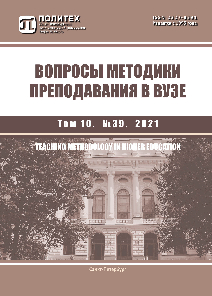Developing reflective thinking of students in the process of interactive learning a foreign language
The article discusses the problems of reflexive thinking formation and meta-subjective cognitive skills in order to prepare students of a technical university for effective professional activity. Critical thinking, creativity, reflexive skills, self-regulatory ability have no less importance than professional knowledge acquired in the field of special disciplines. The evolution of approaches to reflection and reflective methods in pedagogy is considered. Because of the inseparability of thinking and speech, communication and cognitive processes, foreign-language learning can make a significant contribution to the formation of the intellectual apparatus of student’s personality. The article presents elements of the methodology, based on the systematic inclusion in the foreign language educational process of out-of-class interactive activities, step by step implementing reflective and regulatory components. The methodology is illustrated by examples of the organization of reflexive foreign-language learning process. The promising results of the pilot teaching/learning project were obtained with the use of standardized testing methodologies.



